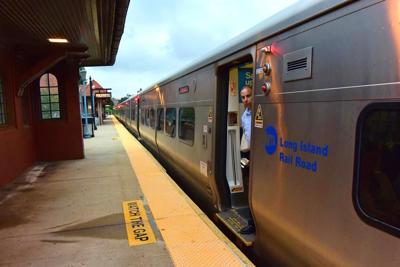Transit advocates and elected officials are calling on the MTA to expand an existing discount ticket program on the Long Island Rail Road to every commuter rail station within New York City — an initiative that would have a considerable impact on Queens.
The Permanent Citizens Advisory Committee rallied at the Woodside LIRR station on Wednesday morning to make the case to the MTA that lowering fares does not mean lower revenues.
And it has the data to back it up. PCAC’s push to expand the Atlantic Ticket, the existing program that offers discounted fares to passengers riding between Atlantic Terminal in Brooklyn and Southeast Queens, coincided with the release of a new report, Freedom Ticket Phase II: Now, More Than Ever.
“What this proves is that riders are smart. They don’t want to be gouged and they want to save some money. We can increase ridership by lowering prices,” state Sen. Leroy Comrie (D-St. Albans) said at the press event.
The report points out that driving up revenue for the LIRR may require a leap of faith. While it may seem counterintuitive to the MTA’s precarious financial status, it argues discounts generate more ridership and increase profits.
The Atlantic Ticket’s pilot program reduces a one-way LIRR ticket from $10.75 to $5 and a combined weekly MetroCard and LIRR fare, totaling $108, to $60. The reductions led to an overall 45 percent increase in revenue at eligible stations in 2019 from comparable 2016 data, according to the report. From their implementation in June 2018 through June 2021, more than 2 million Atlantic Tickets have been sold, resulting in nearly $16 million in revenue for the LIRR, it said.
The expansion it proposes starts with increasing the accessibility of the Atlantic Ticket as it exists.
The report argues that the pilot was a success despite a lack of promotion from the MTA, and suggests tweaks to the program like creating a bus and subway transfer option for the one-way fare, reprogramming the vending machines at eligible stations to make the discounted rate the default option and creating a marketing campaign that would attract riders to the new program.
“[The Atlantic Ticket] has been helping our Queens residents very well for the past few years with very little fanfare and hardly any attention, and very limited outreach and promotion by the MTA,” said Comrie.
The first phase of the “Freedom Ticket” expansion would apply to nearly all LIRR and Metro North stations within the city limits, and include transfers to city subways and buses. In Queens, that would mean bringing discounted tickets to an additional 13 stations in the northern half of the borough from Long Island City to Little Neck. The only station that it leaves out would the Mets-Willets Point stop.
The report acknowledges that the pandemic has resulted in a wide-reaching increase in remote work that has dampened transit ridership overall, but points out that that is not the case for essential workers, who exist in greater numbers in Queens. It found that 35 percent of the workers who live in the areas that would be affected by the expansion are employed either in healthcare or the service industry, and are likely to depend on transit to get to work.
The convenience that cheaper commuter rail would afford to residents in northeastern Queens is considerable. The study found that the LIRR reduces average travel times from Bayside to Midtown Manhattan from a 82-minute commute using the Q13 to the 7 train to 28 minutes on the rail — nearly a half hour faster than it would take with a car.
“For most residents of Northeastern Queens, the Long Island Rail Road is not an option because of the pricing structure,” said Councilman Barry Grodenchik (D-Oakland Gardens) at the rally.
Beyond the immediate goal of bringing the freedom ticket to all stops within the city limits, PCAC also has proposed a second phase that would offer certain discounts for suburban LIRR and MNR riders.
“We don’t need the private sector here. This is all about government. We’re going to have to subsidize it but we’re going to increase the quality of life and we’re going to make the environment that much better,” Grodenchik said.












Commented
Sorry, there are no recent results for popular commented articles.